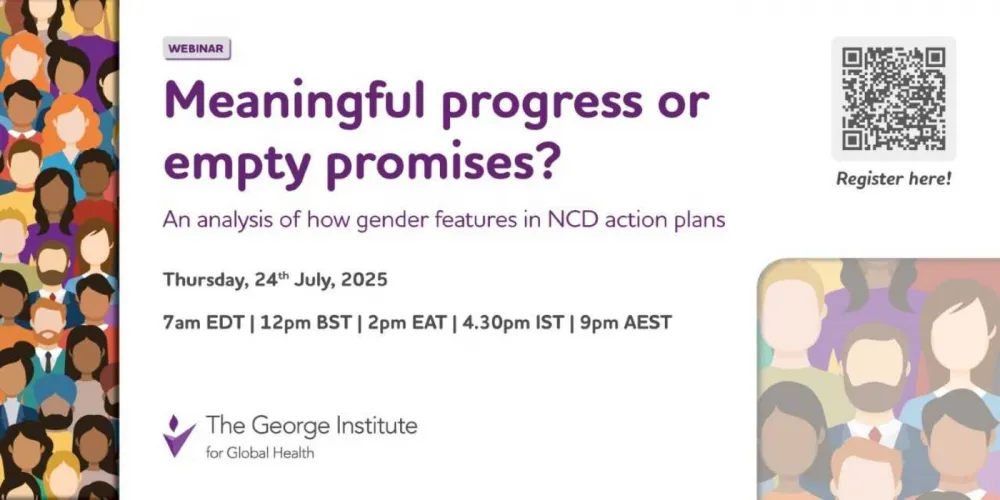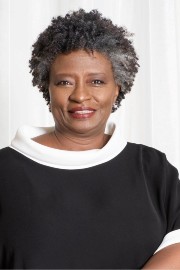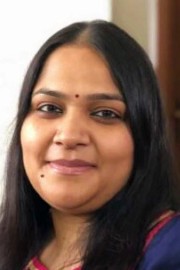Meaningful progress or empty promises? An analysis of how gender features in NCD action plans

Non-communicable diseases (NCDs) are the leading cause of death and disability for women globally – killing two out of three, accounting for up to 19 million deaths every year. Around the world, girls and women living with or at risk of developing NCDs experience unique challenges in accessing prevention, early diagnosis, treatment, and care, particularly in low-resource contexts.
In recognition of the gendered nature of the challenges, governments around the world have repeatedly committed to take gender-based approaches to the prevention and control of NCDs since the first UN High-Level Meeting on NCDs was held in 2011. But have these commitments led to meaningful progress?
Join us for a timely webinar as we dissect this question ahead of the fourth UN High-Level Meeting on NCDs in September 2025. We will disseminate key findings from a new George Institute policy brief that analyses how gender has been integrated into national NCD action plans.
Date: Thursday, 24 July
Time: 7am EDT, 12pm BST, 2pm EAT, 4.30pm IST, 9pm AEST
This event will not only share research insights but will also provide a platform for a dynamic discussion on the gap between policy and implementation. We'll explore opportunities for strengthened advocacy and the urgent need for accountability mechanisms to ensure these critical commitments are met.
The webinar will feature a presentation of our research findings, followed by a panel discussion with leading experts and advocates, including:

Magda Robalo
Executive Director, Women in Global Health (WGH)
Magda Robalo is the President and Co-Founder of the Institute for Global Health and Development (IGHD), Guinea-Bissau.
An Adjunct Professor at Griffith University, she Co-Chairs the UHC2030 Steering Committee and the Africa-led HIV Control Working Group and is a Global Ambassador of the G7 & G20 Health and Development Partnership.
Magda Robalo is a public health physician with a career of over 30 years in the global health ecosystem. A former Minister of Health of Guinea-Bissau, she led the COVID-19 response as the High Commissioner of the Presidential Task Force.
From 2020-20225, Dr. Robalo played a leadership role at the Ethics and Governance Committee of the Global Fund to fight AIDS, Tuberculosis, and Malaria. Prior to these roles, Dr. Robalo was Director of Communicable Diseases and WHO Representative to Namibia and Ghana, among other senior positions with the World Health Organization Africa Region.
She initiated and led transformative actions throughout her career, aiming to improve health outcomes, establish inclusive and accountable governance systems, empower women and girls, and promote equitable access to quality health care. She is deeply engaged in co-creating solutions for Africa’s health sovereignty, sustainable financing, and overall economic development.
She is a member of various Boards and Advisory Committees and a Commissioner of the Lancet Global Health Commission on People-Centered Care for Universal Health Coverage, led by the Center for Primary Care at the Harvard Medical School.

Bhanushree Soni
Research Assistant, Meta-research and Evidence Synthesis Unit, Health Systems Science, The George Institute for Global Health, India
Bhanushree Soni contributes to a range of interdisciplinary projects aimed at improving health policy and practice. She holds a bachelor’s degree in Physiotherapy and a Master of Public Health from JIPMER. Her core areas of expertise include evidence synthesis, health policy analysis, and quantitative analysis. Her research interests are in the domain of non-communicable diseases, health equity, and health systems strengthening.

Catherine Karekezi
Executive Director, NCD Alliance Kenya
Catherine Karekezi, a pharmacist by profession with PhD specialisation in Medicinal Chemistry, holds key positions in the non-communicable diseases (NCDs) arena as Executive Director Non-communicable Diseases Alliance Kenya, Member of Research Committee NCD Alliance East Africa and a founder Director of Kenya Diabetes Management & Information Centre. Catherine contributes to NCD prevention, health system strengthening, research, advocacy and policy development in the region.
Dr Karekezi has previous experience in research and academia at: Rhodes University (South Africa), University of Nairobi, USIU Africa and Kenya Medical Research Institute.
Inika Sharma
Research Officer, Meta-research and Evidence Synthesis Unit, Health Systems Science, The George Institute for Global Health, India
Inika Sharma has completed her undergraduate in Psychology (BA Hons) from the University of California Berkeley and received an MSc in Developmental Psychology and Psychopathology from King’s College London. She has varied research experience and interests, primarily in the fields of mental health, climate change, meta-research, and equity in health. She has recently worked on an early career grant project to determine the prevalence of depression and post-traumatic stress disorder (PTSD) among snakebite survivors in the Sundarbans, West Bengal.

Radhika Shrivastav
Senior Director, HRIDAY
Radhika Shrivastav is the Senior Director at HRIDAY, an India-based non-profit focused on NCD prevention through research, capacity building, and advocacy. She serves as Convenor of the Healthy India Alliance/India NCD Alliance and holds leadership roles in global NCD forums, including the WHO Civil Society Working Group. With over two decades of experience, she champions civil society, youth, and community engagement for NCD prevention and control. Radhika leads national research initiatives on meaningful community engagement for NCDs, is currently a Principal Investigator for a multi-centre pan-India community-based trial to enhance community involvement in the National NCD Programme. She also contributes to ethics and advisory boards, promoting equity and empathy in healthcare.

Shakira Choonara
Thematic Lead, Generation Equality Action Coalition on Bodily Autonomy and SRHR, UN Women
Shakira Choonara, is a multi-award-winning public health practitioner, her notable accolades include being named the 2017 Woman of the Year in Health in South Africa and being a 100 Most Influential Young African. Dr Choonara is currently appointed to UN Women HQ as the Thematic Lead for Generation Equality. Through her role at UN Women she supports 300+ partners globally to advance gender equality, and sexual and reproductive health and rights. Dr Choonara is also a Commissioner and Steering Group Member for the recently launched Lancet Commission on Adolescent Health and Wellbeing.
This is a vital conversation for researchers, civil society organisations, policy advocates, and anyone with a lived experience of NCDs. Together, we can shape the future of gender-equitable NCD prevention and care.
Register now to secure your spot and receive a copy of the policy brief when it is released.
